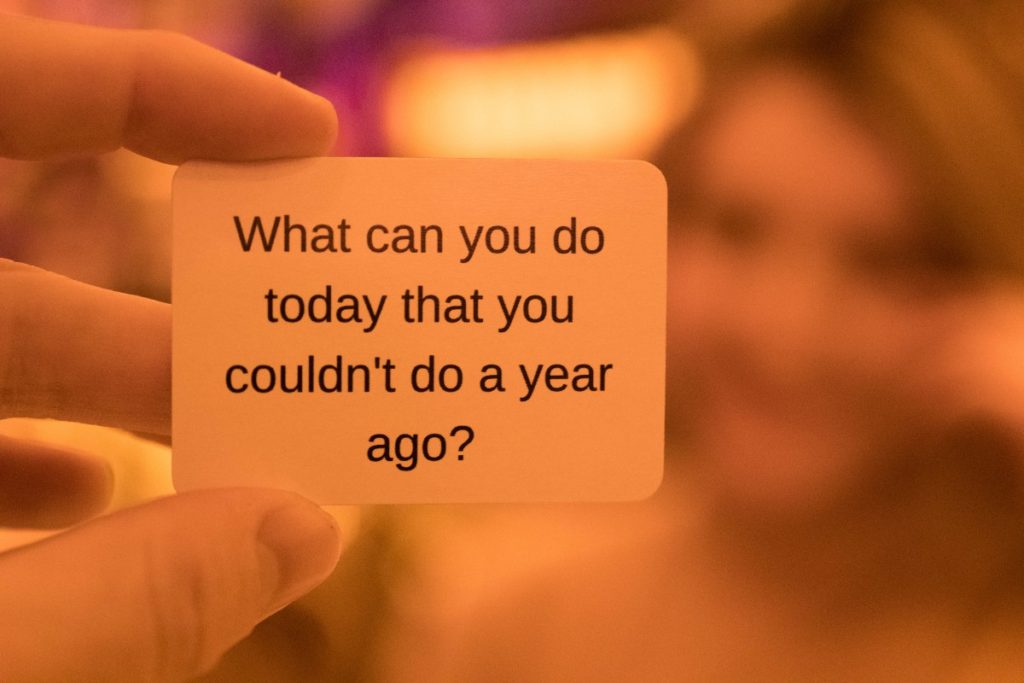
Tying Self-Worth to Results: The Limiting Effects of a Rigid Mindset

In a world that is constantly evolving, the ability to change perspective and adapt is becoming increasingly important to preserve our well-being. Yet, some of us remain stuck in old habits, unable to embrace new ideas or adjust our life to new circumstances.
Have you ever felt as if you were trapped by your own rigid beliefs? This may have occurred to you when facing major life changes like transitioning to a new career or ending a meaningful relationship: the attachment to a fixed identity and to past experiences, and the need to stick to familiar ways of doing things made you feel insecure and fearful of the unknown. Did you notice how you struggled to see beyond your usual way of thinking even when presented with new information or evidence that challenged your beliefs?
When you rely on an extreme and fixed set of emotions, beliefs, and behaviors to make sense of yourself and the world, you are adopting what psychologists call a rigid mindset.
Why should you care about your mindset?
The unyielding and unchanging perspective on the world that characterizes a rigid mindset, may impact different areas of personal development hindering your ability to evolve, learn, and establish meaningful relationships with others.
In this article, we will explore the definition of a rigid mindset, its underlying causes, and potential consequences. Finally, we will review some strategies to adopt a less extreme way of seeing the world.
What exactly is a rigid mindset?
The concept of a rigid mindset was popularized by psychologist Carol Dweck in her research on motivation and achievement. In her seminal work, “Mindset: The New Psychology of Success,” Dweck outlines the difference between a growth mindset and a fixed and rigid mindset, highlighting how these two perspectives are shaped in childhood and how they can impact motivation, learning, and success.
Dweck’s research suggests that people with a rigid mindset perceive their intelligence and talents as inherent and immutable; as a result, they tend to focus on proving they have these inborn qualities. Whereas, people with a growth mindset believe that their abilities can be developed through effort and dedication, which leads to a more proactive approach to challenges and learning.
Dweck’s work has had a significant impact on the field of education: her insights were incorporated into many teaching practices. Other researchers have also built upon Dweck’s work, investigating the effects of a rigid mindset on various outcomes, including academic achievement, well-being, and leadership.
Why do some people struggle with a rigid mindset more than others?
It’s important to recognize that no one has a purely fixed or growth mindset. Instead, people tend to have a mixture of both, and that mixture can change over time depending on their experiences and the environment they are in.
Like every human trait, children’s mindset is shaped by a complex interplay of factors including genetics, environment, and personal experiences. However, parents and caregivers have a crucial role in fostering a growth mindset and setting the stage for lifelong learning.
According to Dweck, the messages that children receive from parents and caregivers can have a significant impact on the development of their mindset. For example, parents who praise children for their intelligence or talent may be fostering a fixed mindset; parents who emphasize the importance of effort and hard work and praise children for their perseverance and determination may be promoting a growth mindset.
Other factors contributing to the development of a fixed mindset in adult life are the tendency to negative self-talk and a lack of exposure to growth-oriented individuals (Dweck, 2006). For example, individuals who constantly tell themselves that they are not good enough may develop a fixed mindset, as well as students who spend all their time with classmates fixated on goals and results.
The impact of adopting a rigid mindset
If you have a tendency to an inflexible and static set of beliefs, attitudes, and opinions, you are more likely to view yourself and the world in black-and-white terms and may struggle to consider alternative perspectives. You may cling to your beliefs despite evidence to the contrary and become defensive when those beliefs are challenged.
Let’s consider the impact of a rigid mindset on a few areas of professional and personal life.
1. Career and education
In educational and career contexts, a rigid mindset can limit an individual’s ability to learn and grow. Individuals may resist trying new things or taking on new challenges, which can prevent them from learning new skills (Dweck, 2006).
2. Mental health and wellbeing
People with a tendency to adopt a rigid mindset may focus on appearing talented rather than enjoying the process of acquiring new skills. A way to look smart is to show results and achievements. By constantly striving to appear competent and successful, people with a rigid mindset may feel like they are maintaining their sense of self-worth.
When people equate their self-worth with their achievements and results, they may feel the constant need to be productive and work towards a goal in order to maintain a positive self-image. This focus on results can obscure the process and the present moment, leading to an unbalanced lifestyle and poor mental health.
In a study published in Frontiers in Psychology in 2015 students with a growth mindset showed higher levels of school engagement and psychological well-being. The relationship was partially mediated by resilience, which means that while resilience is a significant factor, it is not the only factor at play for students who tend to adopt a growth mindset. Further research is needed to fully understand the complex relationships between these variables.
Another study published in the Journal of Psychology in 2019, also showed that having a growth mindset had a positive impact on an individual’s well-being and performance in school. In this study, well-being had a mediating effect on the relationship between a growth mindset and performance.
3. Leadership
“Rigid mindsets can have a major impact on an individual’s ability to perform in the workplace. Individuals with rigid mindsets are less likely to take risks and embrace change, which can limit their potential for growth and success.”. Dr. David Rock, neuroscientist, and founder of the NeuroLeadership Institute
Kouzes and Posner (2019) have shown that growth-minded managers are more likely to engage in effective leadership behaviors, such as setting themselves as an example for others or inspiring a shared vision.
Growth-minded leaders are also more accepting of feedback, whether positive or negative and view it as an opportunity for learning and growth (Keating and Heslin, 2015; Sherf and Posner, 2018). Those with a fixed mindset tend to view negative feedback as criticism and are more likely to avoid or ignore it (Keating and Heslin, 2015; Yeager and Dweck, 2012).
Additionally, managers exhibiting a growth mindset have a greater sense of optimism about future possibilities. They tend to envision what things could be like with appropriate action (Keating and Heslin, 2015; Snyder, 2002).
4. Social connections
People adopting a rigid mindset may be reluctant to be open and honest about their weaknesses and failures because they are preoccupied with maintaining a positive self-image. This can inhibit the development of close relationships.
Dweck’s (2006) work indicates that people with a rigid mindset may be less likely to engage in group activities or experiences that involve vulnerability and trust. This may limit their ability to build strong, meaningful relationships with others.
Children who often adopt a rigid mindset may also embrace the idea that social skills, as well as the quality of peer relationships, are fixed and cannot be improved. A study by Rudolph (2010) found that children with a fixed mindset about social interactions were more likely to prioritize performance-based social goals and to respond to negative feedback from peers with low self-esteem, depressive symptoms, and aggressive behavior as compared to children who considered social interactions as dynamic and social skills as malleable.
According to Rudolph (2010), while children with a fixed mindset see peers’ negative judgments as a threat to their self-worth, for children with a flexible mindset, feedback from others serves as a tool for growth. Surprisingly, they also observed that children with a fixed mindset did not show an increase in self-worth when receiving positive feedback. This could be because their self-esteem is so fragile that positive feedback does not have a lasting impact or because they continue to feel the need to prove their social competence, even after receiving positive feedback.
Holding a fixed mindset was detrimental also to social connections established by college students or young adults.
Having said that, a rigid mindset is not a disease or a personal fault.
Everyone may adopt this extreme way of thinking to some degree, but some individuals may be more prone than others due to their upbringing and past experiences.
So, how can individuals break free from rigidity and develop a growth mindset?
It’s important to note that many factors can trigger a rigid mindset and that no one can argue to have a pure growth mindset. As for most things in life, it is about finding a balance. By actively working to shift your perspective, it is possible to develop a more realistic and flexible set of beliefs.
There is no one-size-fits-all approach. Hereby are some strategies that have been found to be effective:
- Challenging negative self-talk — David Yeager, a psychologist, and researcher in the field of educational psychology, has studied the impact of self-talk on motivation and mindset.
- Fostering resilience by reframing failures as opportunities for learning — This approach is based on the work of psychologist and researcher Angela Duckworth who has studied the role of grit and perseverance in success.
- Cultivating a positive attitude by clarifying one’s values and focusing on self-exploration — This approach is based on the positive psychology movement, which emphasizes the importance of focusing on strengths rather than just weaknesses. The work of psychologist Martin Seligman is particularly influential in this area.
- According to Dr. Dweck, the key to breaking free from a rigid mindset lies in embracing a “process orientation”: focusing on the effort and process of learning, rather than the end result. This shift in perspective can help individuals place less emphasis on the final outcome and therefore feel more appreciative of the journey.
Takeaway
An extremely rigid mindset can limit a person’s ability to learn, grow, and form meaningful connections. A combination of self-reflection and intentional effort to shift perspective can be useful to acquire a growth mindset, which is like having a more realistic and flexible set of thoughts about us and the world.
When we approach most events in life with a growth mindset, we are more open to finding meaning and satisfaction in the journey, rather than just the destination. We learn to be authentic and see mistakes as opportunities to discover blind spots and grow in a more sustainable and connecting way.
Literally, we should be curious when we fail! Failures may be clues to who we really are, rather than evidence of our limitations.
Easier said than done, right?
Your journey toward a flexible and growth mindset has just started. I will dig deeper into each aspect mentioned here in future posts. One step at a time. Stay tuned.
Share This Post
More To Explore


Inside the Mind: How Empathy Rescues a Hijacked Brain
The Amygdala Hijack and The Response of The Prefrontal Cortex

One response to “Tying Self-Worth To Results: The Limiting Effects Of A Rigid Mindset”
I was pretty pleased to discover this web site. I want to to thank you for your time for this fantastic read!! I definitely really liked every bit of it and I have you book marked to see new things on your web site.